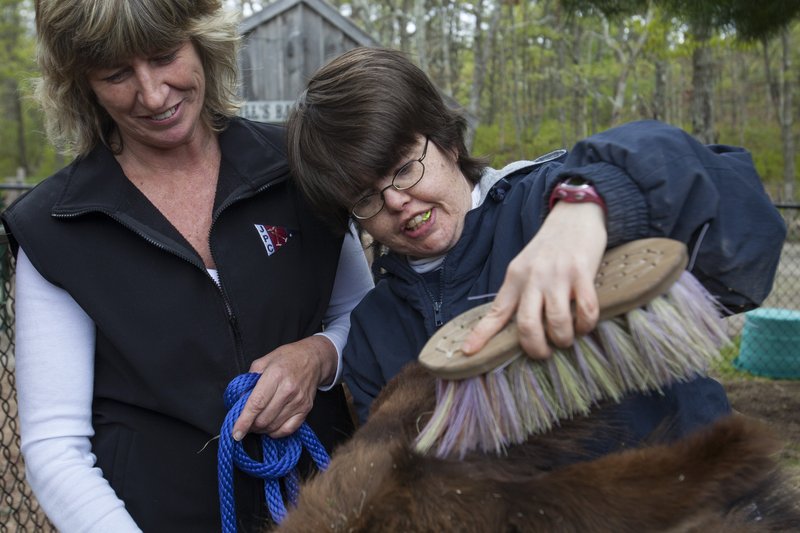SANDWICH, Mass. – Diane Gaudet gently guided a curry comb across the coarse mane of Jake the miniature donkey, smoothing out the wiry hairs on his brownish-gray coat.
Her subject was no dismal Eeyore on this late spring afternoon; in fact, Jake seemed to tilt his head in approval of all the attention.
“OK, Jake, keep your head still,” Gaudet admonished. “Your hooves are next, there, buddy.”
Then came a sort of donkey pedicure. Using a hoof pick, Gaudet scraped some dirt and gunk off Jake’s hind hoof — an important daily duty to prevent infections.
It’s been a brave new world for several dozen people with complex special needs who have participated in the Latham Centers’ donkey therapy program since 2009. Animal therapy often involves horses, but Latham officials thought that donkeys would be calmer and the perfect pet to help people improve emotionally and socially.
The nonprofit Latham Centers offers support and treatment for developmentally delayed children as well as children and adults with Prader-Willi syndrome, a genetic disorder that causes a chronic feeling of hunger, among other issues.
The sometimes stubborn stars at Latham’s adult group home in East Sandwich are four resident miniature donkeys named Jake, Curly, Angus and Moonbeam. The daily interaction with the donkeys has made participants feel more confident and compassionate, and it provides them with important life skills, said Anne McManus, Latham’s president and CEO.
“What we’ve found is that it has really transformed some folks’ lives: made them much more responsible, made them want to go out and do other things — work in the community, get vocational training. It’s been a real enhancement,” McManus said.
Latham’s miniature donkey therapy initiative, called asinotherapy, involves far more than just feeding hay to the animals.
Participants must go through a six- to eight-week “Donkey 101” training course. Led by trainer Kris Thompson, the sessions involve everything from treating a sick donkey to learning about the animals’ personalities.
Sure, caretakers have to do all of the messy donkey chores like mucking out the stalls and cleaning up the paddock, but they also get to play with the donkeys on the obstacle course.
Every time Janice Robichau arrives for donkey therapy, she is greeted with a chorus of hee-haws.
“When I come in here at 9:30 a.m., they are all yelling at me. They want to be fed their breakfasts,” said Robichau, who has been with Latham for 20 years.
Robichau has participated in donkey therapy for about a year. One of her favorite activities is guiding 7-year-old Curly as he zigzags through orange parking cones in the obstacle course.
“I like working with the donkeys because they are very, very interested in what you’re going to do with them and they bond very close with you,” Robichau said.
Individuals with Prader-Willi syndrome can have poor muscle tone and cognitive and developmental delays, but are most known for the inability to feel full, McManus said. The genetic disorder affects one in 15,000 individuals, she said. May is Prader-Willi Syndrome Awareness month.
“It’s very difficult to live in a world where food is around all the time, to manage the appetite and food-control issues that come with having Prader-Willi syndrome,” McManus said.
Staff at Latham Centers have noticed some similarities between the miniature donkeys and people with Prader-Willi syndrome. Both can have a gentle but stubborn demeanor. That mirroring provides more opportunities for building trust and self-esteem.
“(Donkey therapy) really helps people develop patience,” McManus said. “Sometimes the donkey does not want to do something. And individuals with Prader-Willi syndrome sometimes get stuck behaviorally — they don’t want to move on. So it really helps them gain some insight into their own inabilities, to kind of switch gears at some points, so it’s been very educational from that perspective.
“The donkeys just bring out the best in the residents,” Thompson said. “They can come in when they’re feeling low and they leave happy, and that’s really important.”
Send questions/comments to the editors.



Success. Please wait for the page to reload. If the page does not reload within 5 seconds, please refresh the page.
Enter your email and password to access comments.
Hi, to comment on stories you must . This profile is in addition to your subscription and website login.
Already have a commenting profile? .
Invalid username/password.
Please check your email to confirm and complete your registration.
Only subscribers are eligible to post comments. Please subscribe or login first for digital access. Here’s why.
Use the form below to reset your password. When you've submitted your account email, we will send an email with a reset code.